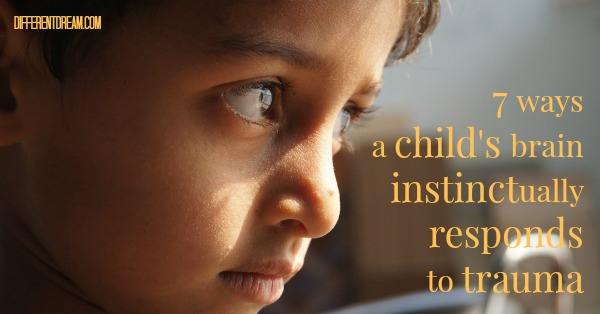7 Ways the Brain Responds to Traumatic Events

Have you ever wondered how the brain responds to traumatic events? Thanks to decades of research and the advent of medical imaging techniques, mental health care professionals have more answers to that question than ever before. This month’s video for Rising Above Ministries summarizes seven ways the brain responds to traumatic events or perceived danger.
To watch the video click on 7 Ways the Brain Responds to Traumatic Events.
You can find more information about this subject in the Different Dream blog post, A Look Inside: The Brain’s Response to Childhood Trauma. For even more information, check out Does My Child Have PTSD? which has a chapter devoted to the topic.
For the rest of the RAM videos in this series, check out these links:
Episode 1: Special Needs Parenting Is Different Dream Living
Episode 2: Childhood Trauma by any Other Name Is Still Traumatic
Episode 3: Myths about PTSD in Children, Part 1
Episode 4: Myths about PTSD in Children, Part 2
Episode 5: The Surprising Causes of PTSD in Children
Do you like what you see at DifferentDream.com? You can receive more great content by subscribing to the quarterly Different Dream newsletter and signing up for the daily RSS feed delivered to your email inbox. You can sign up for the first in the pop up box and the second at the bottom of this page.
By Jolene
Jolene Philo is the author of the Different Dream series for parents of kids with special needs. She speaks at parenting and special needs conferences around the country. She’s also the creator and host of the Different Dream website. Sharing Love Abundantly With Special Needs Families: The 5 Love Languages® for Parents Raising Children with Disabilities, which she co-authored with Dr. Gary Chapman, was released in August of 2019 and is available at local bookstores, their bookstore website, and at Amazon.
Subscribe for Updates from Jolene
Related Posts
Finding Balance in Special Needs Parenting and Stress, Pt. 7
Finding balance in special needs parenting and stress is a tricky proposition. That’s the question answered in this post in the series about PTSD and stress.
Address Your Stress
When traumatic memories of caring for a child with special needs rule your thoughts, it’s time for parents to address their stress following these 6 steps.
Explaining Secondary PTSD and Stress to Others, Pt. 6
How to explain secondary PTSD to friends & family who think it’s something only soldiers deal with? Dr. Liz Matheis offers suggestions in this Q & A.






0 Comments